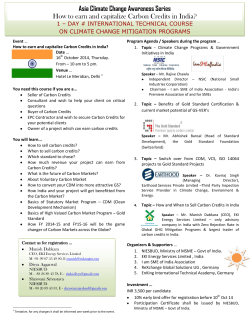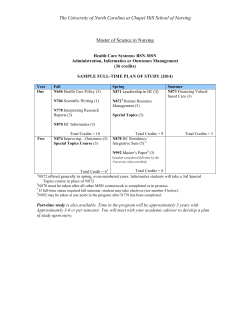
Taught Postgraduate External Examiners Briefing Day For New External Examiners 2011/12 Academic Session
Taught Postgraduate External Examiners Briefing Day For New External Examiners 2011/12 Academic Session What are we covering? • The DMU Context • The Taught Postgraduate Scheme • The Role of the External Examiner • External Examiner Reports The De Montfort University Context Roles within the University • Devolved University • Role of the Centre Role of Individuals • PVC/Dean • Deputy Dean • Head of School/Department • Programme Leader • Subject Leader • Module Leader • Head of Postgraduate Studies • Head of Quality The Taught Postgraduate Scheme Programme Specific Regulations • Presentation covers the generic scheme • Some programmes have programme specific regulations which are more stringent • Programme specific regulations will be published as an annex in the Taught Postgraduate Programmes University Regulations from 2012/13 The Credit Framework DMU uses nationally recognised credit tariff: • 1 credit = 10 student learning hours • Modules based around units of 15 credits (150 student learning hours) • Standard modules (15 credits), double modules (30 credits) • Postgraduate dissertation module normally worth 60 credits • Semester based system Programme Specification • DMU uses ‘templates’ to define curricula • Two levels of templates defining programme and module • Programme templates place subject in national context, including subject benchmarks • Module templates use learning outcomes methodology and link this to assessment • Programme templates define student outcomes as per QAA programme specification Awards & Credits Award Total credits Level of Credits MA/MSc 180 Minimum 150 at level 7 Postgraduate diploma 120 Minimum 90 at level 7 Postgraduate certificate 60 Minimum 45 at level 7 • The University adheres to the Framework for HE Qualifications for England, Wales and Northern Ireland (FHEQ) and the Credit Framework which designate master’s awards at level 7. The FHEQ contains generic descriptors which define awards at master’s level. Maximum Periods of Registration Award Full-time Part-time Master’s degree with sandwich 4 years 7 years Master’s degree 3 years 6 years Postgraduate diploma 2 years 4 years Postgraduate certificate 1 year 2 years Moving through the programme • Module pass mark = 50% (some continuing students will still be on ‘old’ 40% pass mark) • All modules should be passed to gain award • One reassessment attempt is available in each module Award of Distinction Master’s: dissertation is at distinction level (70%) and either at least 120 credits are at distinction level or the overall average mark is at distinction level PgDip: either at least 90 credits at distinction level or the overall average mark is at distinction level PgCert: either at least 45 credits at distinction level or the overall average mark is at distinction level Award of Merit Master’s: dissertation is at merit level (60%) and either at least 120 credits are at merit level or the overall average mark is at merit level PgDip: either at least 90 credits at merit level or the overall average mark is at merit level PgCert: either at least 45 credits at merit level or the overall average mark is at merit level Changes and Withdrawals • Modules – up to 30 credits can be substituted, by end of 2nd week of delivery • Programmes – students can change programme, with agreement of Head of PG Studies, by end of 2nd week of programme • Interruption of studies – granted by Head of Postgraduate Studies, for no more than 1 year in 1st instance. Counts within maximum period of registration The Role of the External Examiner The Overall Purpose of the External Examiner • To ensure that standards are maintained from a subject point of view • To ensure fairness and equity from a student point of view • To act as a critical friend with: - Curriculum developments - Standards Examiners Role with Assessment • Assessment aims and objectives are appropriate • Purposes and philosophy of assessment are articulated and understood • Assessment load is appropriate • Assessment is properly and impartially conducted At the Start of Each Session • Agree the basis for sampling assessments • Engage in consultation about draft papers etc • Agree the basis of visits to the University Outside of the Assessment Boards • Meet students and discuss their work • Advise on individual cases e.g. where there has been internal disagreement about a mark • Sample scripts and assessed material to enable judgments to be made as to the: - overall suitability of assessment methods - coherence of assessment strategy - consistency of internal marking Sampling • Right to see all scripts • Discretion to sample • Can viva voce as required/necessary • Should see: – Assessment(s) marked highest overall – Selection of passed assessments from each mark band – Problematic assessments – All failed dissertations Collaborative Partners • Some programmes are run in collaboration with partners at locations both UK and overseas • External examiners should understand this when sampling in order that they can comment Assessment Boards There is a variety of practice between (and within) faculties ranging from boards responsible for individual programmes to faculty wide boards. Purpose of Assessment Boards • Accountable for academic integrity of assessment in programmes and one or more subjects • Responsible for conduct of assessment including determining module marks and awards • A focus for quality assurance Assessment Boards – Terms of Reference Assessment Board: Management Board: • Teaching, Learning and Assessment strategies • Assessment of students • Programme and subject provision • Achievement and Award • Academic debate • Programme and subject development • Student feedback At the Assessment Boards • Arrangements and processes for module assessments and moderation and for reassessments • Assessment and marking of students • Awards • Compliance with university and professional body requirements including programme specific regulations • Suspension or termination of students • Aegrotats At the Assessment Boards – External Examiners Role • Review and adjust as necessary the overall spread of marks for a module • Consider individual cases • Review module pass rates • Review programme achievement and award data • Give an oral report At the Assessment Boards • The reports… After the Assessment Boards • Complete annual report within one month of main assessment board Reassessment • External examiners should be consulted on the process/arrangements in place for reassessment • How external examiners are engaged/involved in reassessment Extenuating Circumstances • Faculties handle all requests • Outcome : Deferral only Reasons: • Consistency and objectivity • Focus on genuine cases External Examiner Reports When do you report? • Annual Report • Optional Supplementary Reports and Reports to the PVC or VC • Within 1 month of main assessment board Report Headings • Academic standards and programme/module content: taught elements • Academic standards and student performance • Project/dissertation/design work • Module assessment • Delivery and support • Programme management & development • Programme board and administration • Good practice and innovation • Outstanding issues and other key observations • Collaborative provision • UCPD/PgCert Work Based Studies Content • Summary of key points when completing your annual report –Handout What happens to your report? • Send in report electronically to lnewell@dmu.ac.uk to DAQ within 1 month of main assessment board • DAQ will circulate report to the Faculty • PVC/Dean will send initial response to you within 28 days acknowledging receipt of report and main issues • Considered by the relevant management board at which student representatives may be present • A full response will be sent to you within 2 weeks after the management board indicating any action to be taken What happens to your report? Monitoring of Faculty Issues: • Faculty Head of Quality will track Faculty themes, comment upon any regulatory or board operation issues and complete annual report to be presented at Academic Quality and Standards Committee (AQSC) Monitoring of Institutional Issues: • Read by DAQ and institutional themes highlighted. Appropriate person will respond on behalf of University. Issues and responses included in AQSC External Examiner Overview Report • Annual Report for the Academic Quality and Standards Committee (AQSC). Administrative Arrangements Faculty Administration • Managing student records • Programme and module management • Programme and management boards • Operational liaison with external examiners • Faculty quality systems • Pay external examiner fees DAQ Administration • Receive and read all annual and final external examiner reports • Keep track of institutional and Faculty themes • Prepare AQSC Annual Report • Appointments and extensions of appointments Payment of Fees and Expenses What • Annual fee Paid on receipt of annual report (to lnewell@dmu.ac.uk) and claim form (to Faculty contact) • Visit fee Paid on receipt of claim form. Claim after each visit • Dissertation fee Keep track of dissertations and include details on claim form • Expenses Include any receipts Payment of Fees and Expenses Who • Art, Design and Humanities Bally Dhalu (bdhalu@dmu.ac.uk) • Business and Law Sue Owen (seowen@dmu.ac.uk) OR Vicki Clarke (vicki.clarke@dmu.ac.uk) • Health and Life Sciences Alison Levey (alevey@dmu.ac.uk) • Technology Suffiyyah Mohammed (smohammed@dmu.ac.uk) Payment of Fees and Expenses When • Completed and authorised claim forms that are received by Payroll before the 8th of each month will be paid on the 25th of that month (or nearest working day) Contacts • Jo Cooke, Director of Student and Academic Services jcooke@dmu.ac.uk • Leopold Green, Head of Taught Programmes ldg@dmu.ac.uk • Louise Newell, Quality Officer (External Examiners), Department of Academic Quality lnewell@dmu.ac.uk
© Copyright 2025













